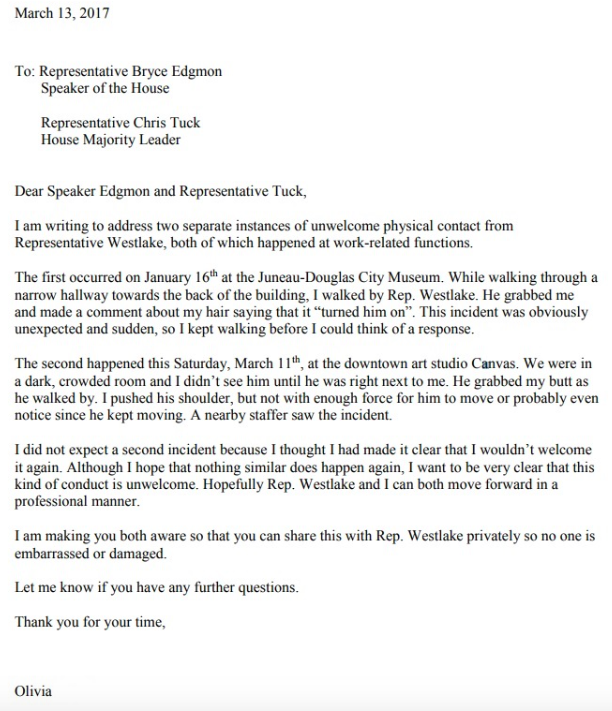What did they know and when did they know it?
Did the House Speaker and House Majority leader agree to keep a complaint of sexual harassment under wraps? Did the two ever plan to act?
Legislative Affairs is now investigating the original complaint of sexual harassment of a legislative aide by Rep. Dean Westlake. The complaint was made in March, and the agency’s Human Resource Director Skiff Lobaugh is in charge of the report.
But who is investigating why Speaker Bryce Edgmon and House Majority Leader Chris Tuck stuck the complaint letter in a drawer, and left a legislative aide fearing for her job? The aide eventually quit.
There is no investigation into what appears to be a cover-up of something that is, by Alaska Statute, a crime.
THE BACKGROUND
On March 13, legislative aide Olivia Garrett gave a letter to House Majority Leader Chris Tuck, detailing two incidents of harassment from Rep. Dean Westlake.

WHAT WAS TUCK’S ROLE?
Majority Leader Tuck had given Garrett specific guidance on how to write the letter, Garrett said. She followed his advice closely, fearing retaliation from Tuck, who is currently the second-most powerful person in the Alaska House, if she didn’t abide by his instructions, Garrett told KTUU.
Garrett said she especially heeded Tuck’s instructions to write that she wanted to “move forward in a professional manner,” and not “embarrass or damage” anyone.
In other words, Tuck helped her write the letter.
Tuck may or may not have shown the letter to Speaker Bryce Edgmon, although it was addressed to both of them. Edgmon has alternately said he didn’t know about the letter, and that he knew about it in March.
“I wrote the letter, gave Rep. Tuck a hard copy, and never heard from him again,” Garrett told KTUU. Garrett, who was a legislative aide for Rep. Scott Kawasaki during session, left legislative service in August. She has in recent days filed a Human Rights complaint against Westlake.
But did the House Speaker know, and for how long? Tuck isn’t saying what he did with the letter, but Edgmon is now admitting he saw it in March.
“In an interview earlier this week, Edgmon, a Democrat, said he became aware of the complaint in March and spoke with Westlake, a first-term lawmaker from Kotzebue,” the Associated Press reported.
Edgmon earlier said that if there are any substantiated claims of harassment, there should be consequences.
“When I say substantiated, I think it has to go through a full investigation process,” he told a reporter.
[Read: What Edgmon said when the harassment complaint became public.]
But complaints can’t be investigated and substantiated if those in power conspire to keep them secret.
Instead, once the complaint became public, Edgmon and House Democrats immediately called on Westlake to resign. So did the Alaska Democratic Party.
Now, neither Edgmon or Tuck will discuss anything about the case because they say it is now a confidential investigation.
Rep. Colleen Sullivan-Leonard has asked for an independent investigation into the entire matter.
WESTLAKE APOLOGIZES, WON’T QUIT YET
For his part, Rep. Westlake has issued a statement of contrition and apology:
I would have preferred to publicly respond to recent allegations, but I am still in recovery from heart surgery and must make a written statement only. These allegations have become a confidential personnel matter, and in respecting the process I cannot discuss the details. I very much wish that I could. However, I will say the following:
I want to once again apologize to any woman whom I have made uncomfortable with either my actions or words. I never intended to hurt anyone, but I understand now that I have. I am truly sorry for that, and I want to thank anyone who came forward. Doing so required strength and bravery.
In the midst of a national moment that has empowered many women to come forward with their painful experiences, I have found myself re-examining my own actions and thinking through how they have affected the women with whom I work and interact.
I, like many men, have learned a lot from the women who have shared their stories over the past few weeks. I used to think of certain actions as friendly or funny, but I have come to understand that they can be offensive and intrusive.
I am imperfect, and I know I have disappointed many people who trusted me to represent them. Let me be clear, I am committed to being better and to changing my behavior. I will learn from this experience, and I will be an ally and supporter of women moving forward.
Many people in the past few days have called for me to resign. I have thought seriously about it, and I have asked for counsel from friends, family, native leaders, Elders, and God. I have decided not to.
I am proud to represent House District 40, which is not a Republican or Democrat district- it is an Alaskan district. I will continue to work on behalf of the people of my district and of Alaska more broadly.
I want to thank everyone who has supported me throughout this time. These stories do not reflect who I am, and I am determined to make it right.
Power play: House members set up own harassment reporting system














